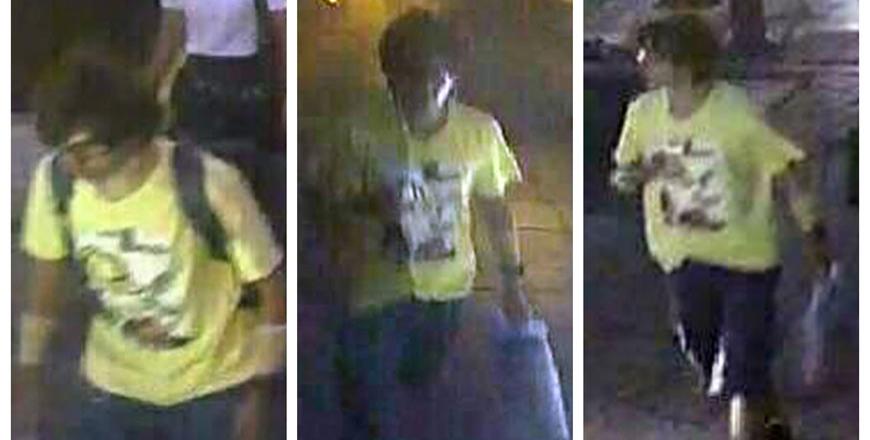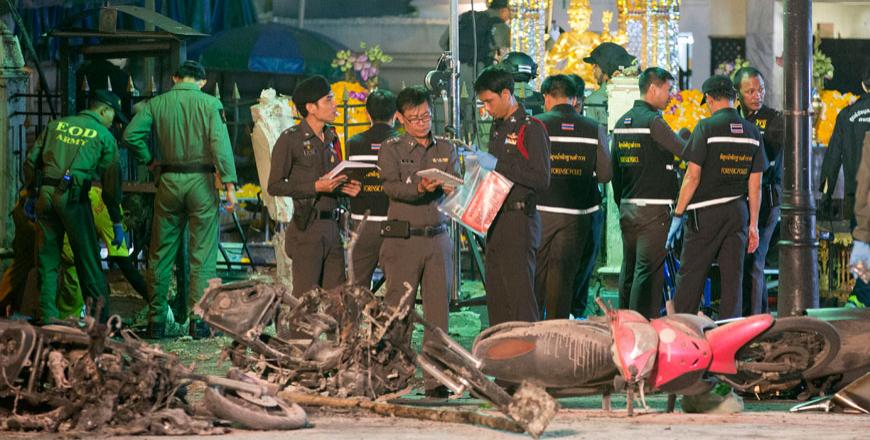You are here
Thai authorities focus on suspect seen in CCTV footage at blast site
By Reuters - Aug 18,2015 - Last updated at Aug 18,2015

In this Monday photo, released by Royal Thai Police spokesman Lt. Gen. Prawut Thavornsiri, shows a man wearing a yellow T-shirt near the Erawan Shrine before an explosion occurred in Bangkok (AP photo/ Royal Thai Police)
BANGKOK — Thai authorities said on Tuesday they were looking for a suspect seen on closed-circuit television (CCTV) footage near a famous shrine where a bomb blast killed 22 people, nearly half of them foreigners.
The government said the attack during the Monday evening rush hour in the capital's bustling commercial hub was aimed at destroying the economy. No one has claimed responsibility.
Jangling nerves in the city on Tuesday, a small explosive was thrown from a bridge towards a river pier, sending a plume of water into the air, but no one was injured.
The man suspected of the bombing at the Erawan shrine was seen in grainy CCTV footage entering the compound with a backpack on, sitting down against a railing and then slipping out of the bag's straps.
Wearing a yellow shirt and with shaggy, dark hair, the young man then stands up and walks out holding a blue plastic bag and what appears to be a mobile phone. The backpack was left by the fence as tourists milled about.
National police chief Somyot Pumpanmuang said the suspect could be Thai or foreign.
"That man was carrying a backpack and walked past the scene at the time of the incident. But we need to look at the before and after CCTV footage to see if there is a link," Somyot told a news conference.
Police earlier said they had not ruled out any group, including elements opposed to the military government, for the bombing at the shrine, although officials said the attack did not match the tactics of Muslim insurgents in the south.
Prime Minister Prayuth Chan-ocha also referred to the man as a suspect without giving details. He said there were "still anti-government groups out there", although he did not elaborate.
Police were at the blood-splattered site on Tuesday, some wearing white gloves and carrying plastic bags, searching for clues to an attack that could dent tourism and investor confidence.
The Thai baht fell 0.57 per cent to 35.57 baht, its weakest in more than six years, on concern the bombing may scare off visitors. Thai stocks fell as much as 3 per cent.
Police said the death toll was 22, with 123 people wounded.
"Police are not ruling out anything including [Thai] politics and the conflict of ethnic Uighurs who, before this, Thailand sent back to China," Somyot said.
Thailand forcibly returned 109 Uighurs to China last month.
Hundreds, possibly thousands, of members of the Turkic-speaking and largely Muslim minority have fled unrest in China's western Xinjiang region, where hundreds of people have been killed, prompting a crackdown by Chinese authorities. Many Uighurs have travelled through Southeast Asia to Turkey.
Chinese call
The blast comes at a sensitive time for Thailand, which has been riven for a decade by a sometimes violent struggle for power between political factions in Bangkok.
An interim parliament hand-picked by a junta that seized power in a 2014 coup is due to vote on a draft constitution next month.
Critics say the draft is undemocratic and intended to help the military secure power and limit the influence of elected politicians.
The Erawan shrine, on a busy corner near top hotels, shopping centres, offices and a hospital, is a major attraction, especially for visitors from East Asia, including China.
Four Chinese, including two people from Hong Kong, were among the dead, China's Xinhua news agency said. A British resident of Hong Kong, two Malaysians, a Singaporean, an Indonesian and a Filipino were also killed, officials said.
Scores of people were wounded, including many Asian tourists. China urged Thailand to thoroughly investigate the blast and punish the perpetrators.
Tourism is one of the few bright spots in an economy that is still struggling, more than a year after the military seized power.
It accounts for about 10 per cent of the economy and the government had been banking on record arrivals this year following a sharp fall in 2014 because of protests and the coup.
Occasional small blasts over recent years have been blamed on one side of the domestic political divide or the other. In February, two pipe bombs exploded outside a shopping mall in the same area as the Monday blast but caused little damage.
Thai forces are also fighting a low-level Muslim insurgency in the predominantly Buddhist country's south, but the separatists have rarely launched attacks outside their heartland.
Related Articles
BANGKOK — Thai authorities said Wednesday the man who carried out a devastating Bangkok shrine bombing that killed 20 people was a foreigner
BANGKOK — Police in Thailand said Saturday that they were hoping to identify suspects over the next couple of days in a series of bombing an
BANGKOK — At least 16 people were killed and dozens injured when a bomb exploded Monday outside a religious shrine in a bustling hub of the

















